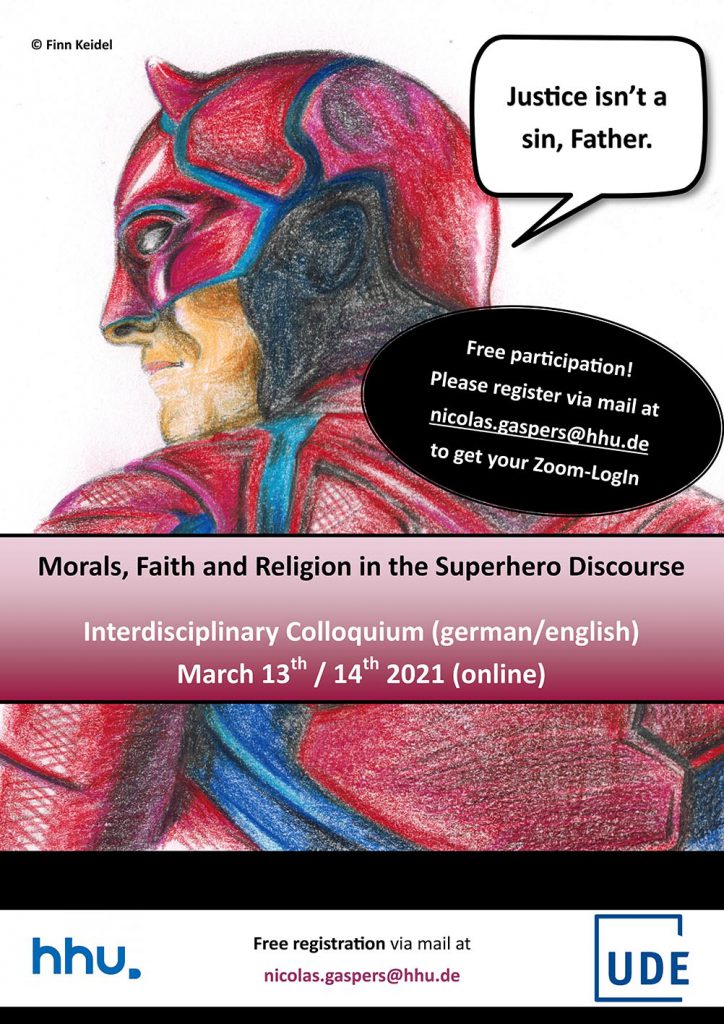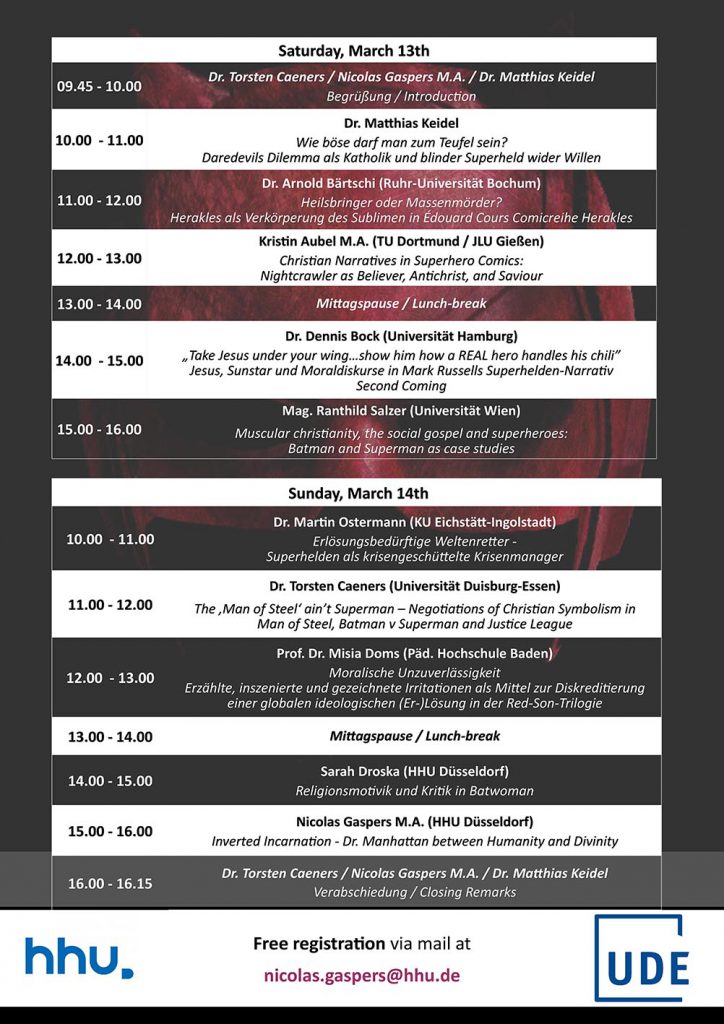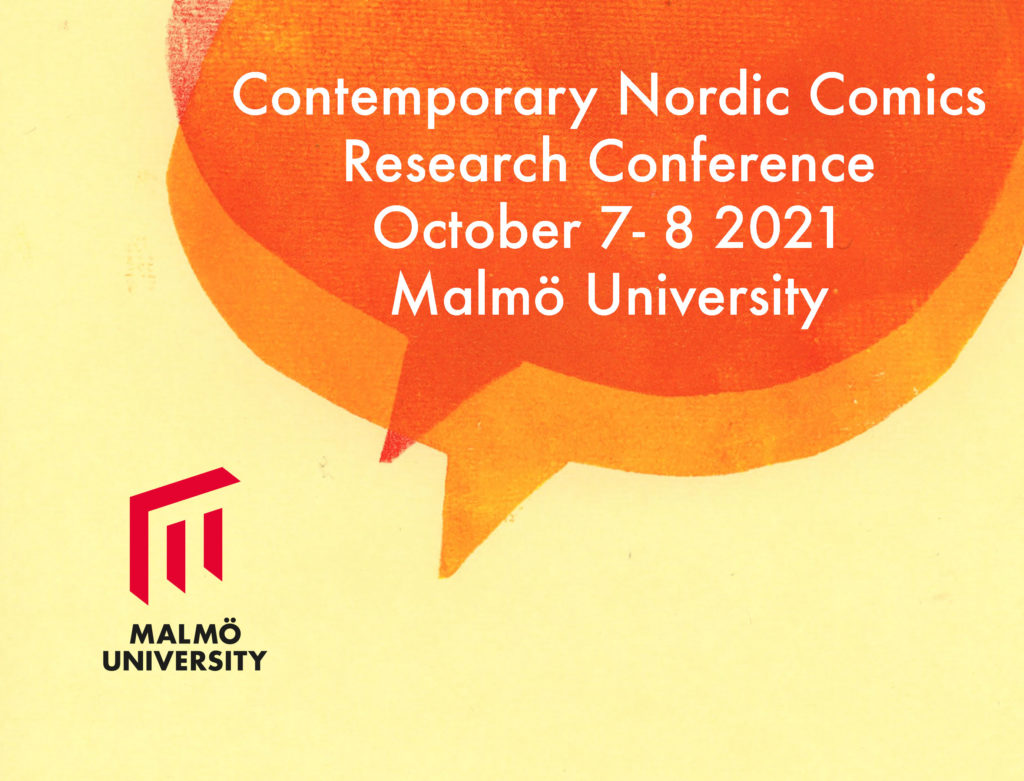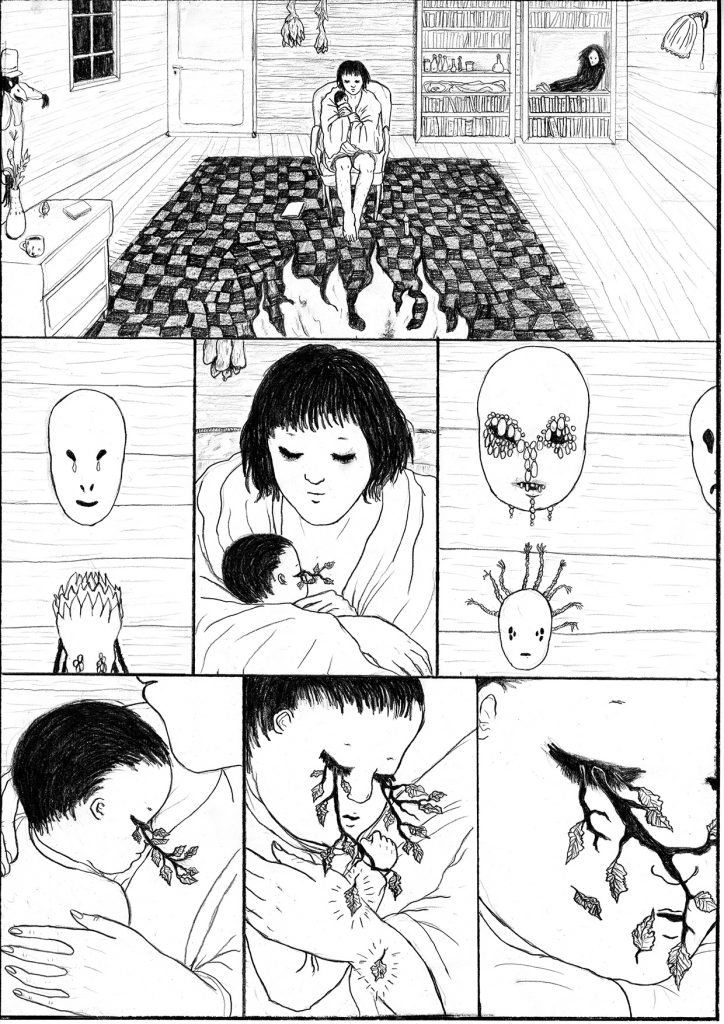This is a quick invitation to / reminder of an Interdisciplinary Colloquium (german/english)
on March 13th / 14th 2021 (online)
Free registration via mail at
nicolas.gaspers@hhu.de


This is a quick invitation to / reminder of an Interdisciplinary Colloquium (german/english)
on March 13th / 14th 2021 (online)
Free registration via mail at
nicolas.gaspers@hhu.de


Call for Papers
This is an invitation for scholars to submit an essay proposal to be included in “The Philosophies of Stan Lee” for the University Press of Mississippi as part of their internationally respected publications in the field.This work is to celebrate the significant contributions made by Stan Lee as one of the most influential individuals in 20th century popular culture. Thus, I am seeking academics who possess a strong familiarity with his work and most importantly, can provide well-reasoned argumentation that is supportive of the book’s aim. Since this project is an appreciation of the man and his creativity it is the aim for it to be available for what would have been Lee’s 100th birthday in 2022.
Audience: Undergraduate university students in 1st/2nd year philosophy and / or comics studies.Writing style: accessible, serious and philosophically rigorous.
The collection seeks to offer philosophical analyses of a broad range of Lee’s endeavours based upon such things as:
• Specific superhero characters
• Non-superhero characters
• Specific storylines and arcs
• Historical eras in Comics (e.g., Gold, Silver, Bronze)
• Various genres (e.g., Western, Horror, Humour)
• Stan’s Soapbox
• POW! Projects
• Outside projects & collaborations (including educational talks)
• Non-comics writing (e.g., captions magazines, newspaper strips, script treatments, etc.)
• Other media forms (e.g., film and television productions)
• as a professional in the comics industry (e.g., as editor, publisher, co-creator etc.)
• as an industry spokesperson
Throughout the book I will be including brief reflections by well known comic book artists and writers who gained a “Lesson from Lee”. Already 25 individuals are signed up to participate.
Please send a note of interest and intent to: jmclaughlin@tru.ca<mailto:jmclaughlin@tru.ca>
A more formal abstract and brief CV will be required early in the new year. Please also forward this CFP to other interested parties and professional discussion lists. I would be happy to respond to any rough ideas you’d like to toss my way. I look forward to hearing from you soon!
/Best Wishes, Jeff
////Dr. Jeff McLaughlin Ph.D.//Full Professor (Philosophy) and Chair//Department of Philosophy, History, and Politics//Thompson Rivers University//805 University Drive//Kamloops BC Canada//V2C 0C8/

The contemporary Nordic comics scene is diverse and multifaceted. Classic characters from the 30s are still popular and exist side by side with avantgarde, feminist, and political comics. A mainstream Nordic comic could very well be represented by semi-autobiographical funny animals published in a daily newspaper; alternately we also find self-published manga and epic genres (noir, fantasy, horror). Twenty-five years ago, the situation was radically different. Many feared that comics would soon be obsolete due to the fast growth of digital media. Since then, however, both comics and comics research has undergone an almost explosive development in the Nordic region. This is especially noticeable in Malmö, branded as The City of Comics, with a rich infrastructure of comics-related initiatives including education, research, professional artists’ networks, publishing companies, comics organizations and The Swedish Comics Archive.
In recent years, academic interest in Nordic comics has also increased substantially, both in the Nordic countries and beyond, in disciplines such as comparative literature, media and communication studies, and art history, as well as within the emerging field of comic studies.
The Contemporary Nordic Comics Research Conference aims to present and discuss current research on Nordic comics, as well as share resources including academic networks, archives, and collaborative projects. A long-term goal is to contribute to the development of both research about Nordic comics and comics research in the Nordic countries through facilitating collaborations between comics researchers in the Nordic countries and researchers in other countries who are also interested in Nordic comics.
We therefor invite the submission of papers to the Contemporary Nordic Comics Research Conference at Malmö university.
Possible topics include, but are not limited to:
* Trends in Nordic comics
* Comparisons between comics in the Nordic countries and abroad´
* The role of comics in Nordic culture(s)´
* The history of Nordic comics
* Nordic comics viewed from abroad
* Comics and the Nordic welfare states
* Nordic comics in dialogue with the world
Please, send proposals of 250 words, plus a short biography to:
gunnar.krantz@mau.se and magnus.nilsson@mau.se no later than March 15.
If the covid pandemic should make it impossible to host the conference in Malmö, it will take place online.
With the new conference layout the VE XXVII steering committee is particularly interested in formats that draw on previous dialogue, such as pre-constituted panels, workshops and conversations (see below) that bring together scholars and practitioners. Along with the usual open call for paper presentations we offer adjusted formats for the hybrid model and ask applicants to read carefully through the format descriptions.
What we call ‘documentary’ emerged in the 1920s and 1930s in response to a perceived crisis of liberal democracy, as a mode of factual representation which empowers citizens to participate in the political process. As the last months have shown, the willingness or unwillingness of citizens to comply with policy makers have crucial effects. How does documentary respond to what has been widely diagnosed as the current crisis of democracy? What could be an adequate reaction in forms, themes and modes of production, to the return to nationalism and other forms of political tribalism in the face of global migration? In what ways does documentary shape our perceptions of the consequences of globalization, from climate change, health crisis, to the transformation of the economy? And how can documentary in theory and practice contribute to defend the spaces and modes of deliberation necessary for the life of democracy?
Visible Evidence, the international conference on documentary film and media, now in its 27th installment, will convene in Frankfurt, Germany, on December 15-18, 2021. Hosted by the Institute for Theatre, Film and Media Studies (TFM) at Goethe University, Frankfurt, Visible Evidence XXVII will address these and other current issues related to the history, theory, practice and pedagogy of documentary and non-fiction cinema, television, video, audio recording, digital media, photography, VR, games and performance in a wide range of panels, workshops, plenary sessions, screenings and special events. We welcome panel, workshop, conversation, screening and paper proposals that address documentary and non-fiction media from a diverse range of disciplines that can open the field to new lines of investigation through innovative and original perspectives.
Designed as a public event in collaboration with the city’s leading cultural institutions, the conference makes a conscious nod towards documentary history as an instrument of public opinion. The notion of crisis, a thread weaved through the history of documentary, and in light of current affairs seems ever more pertinent, calls for new political, formal and social possibilities that consolidate and expand documentary’s role as a space for representation and democratic deliberation. These new possibilities should be explored in a dialogue between theory and practice. We invite scholars, filmmakers, archivists and activists to propose panels and presentations that address any aspect of documentary and non-fiction media. Special threads and themes may include (but are in no way limited to):
Documentary and Conflict: How should we perceive conflict not just as a historically-specific geopolitical crisis, but as an interaction of aesthetic forces that reorders documentary temporalities, geographies and speech-acts? What role is taken by documentary in an age of rising fascism, post- and neo-colonialism, transnational military interventions and global humanitarianism?
Documentary Infrastructures: How does documentary depict and expose industrial infrastructures? In what ways does documentary itself comprise, or challenge, larger social and material infrastructures, including funding structures, distribution platforms and new visual technologies?
Documentary Publics: The advent of new media platforms and technologies bares, on the one hand, potential for a radical reorganization of social bodies. On the other hand, creates fraught contexts through which the social is organized by corporate logic and pseudo-democratic regimes. Framed within these social and medial settings, what forms of deliberation documentary brings to contemporary public and counter-public spheres?
Race, Gender and Sexuality: How can documentary serve as a means of transgression, a tool for community building, or a platform for organization/organizing in a political climate marked by exclusionary tribalisms? How can documentary resurrect non-hegemonic pasts and presents and open up spaces outside of a white, heteronormative and patriarchal matrix?
Documentary and the Non-Human: In the epoch of the Anthropocene and in the wake of environmental crisis, how can documentary exceed its “discourses of sobriety” that centers the human? How can it give form to the material world, traversing the representational hierarchies between the human and non-human? How do documentaries of nonhuman subjects interact with, reinforce or diverge from human political regimes?
Documentary and Operational Media: Considering the proliferation of tools for data analysis, image-based computational techniques and forensic media, how can we re-think documentary’s evidentiary claims at its intersections with fields such as science, medicine, design and law?
Documentary Pedagogy: How can we think of documentary pedagogy through a vernacular prism? How have documentary studies responded to the shifting labor conditions of teaching at individual, departmental, and disciplinary levels? How have they been reshaped by videographic practices of criticism and scholarship? How do the evolving methodologies of teaching and writing about documentary speak to the labor it asks of us?
Documentary and the Politics of Information: The current crisis evolving from the Coronavirus pandemic brought to the surface many questions related to information, its representation, circulation and utilities as a means of governance, surveillance or trust. These questions go back to core assumptions of documentary. How does (and whether) the gesture of informing the public contribute to the forming of responsible and responsive citizenry? How do forms of visualization cater to different relations to authority, or different modes of address?
Homepage: Visible Evidence XXVII:
https://www.visibleevidence.org/conference/visible-evidence-xxvii/
Panel proposal:
Panels will consist of three presentations of no more than 15 minutes for each presentation (online presenters might consider even shorter presentations) with ten-minutes response by the panelists’ chosen respondent. Panel proposals require a title; 300-word description of the panel itself; five keywords that identify the panel’s focus; 250-word abstract for each paper, or for filmmakers 200 words abstract and 20 minutes materials (via link); 100-word biography for each participant and 5 bibliographic entries for the entire panel.
Submit panel proposals here.
Workshop proposal:
The emphasis of the workshop is on an open and unstructured exchange of ideas and techniques between all workshop participants. Workshops will consist of five or six opening statements that sum up to 40 minutes in total (5-7 minutes for each statement), with the remaining time dedicated to discussion. Workshop proposals require a title; 300-word description of the workshop; five keywords that identify the workshop’s focus; 50-word description of each contribution; filmmakers are welcome to add 20 minutes materials (via link); 100-word biography for each participant and 5 bibliographic entries for the entire workshop.
Submit workshop proposals here.
Conversation proposal:
A new format introduced for VEXXVII that consists of a 45-minute conversation between three participants that relies on cross-disciplinary exchange between artists and scholars around shared investigations of concepts, sites, sensibilities and histories. The conversation will be based on work (screeners or papers) that were circulated in advance. Presenters will be asked to send a paper of 1,500 words MAX, or for artists either excerpts or a complete work, a couple of weeks before the conference. The conversation itself will be based on the pre-circulated essays and visual materials. Conversation proposals require a title, 200-word description of the general theme; five keywords that identify the conversation focus; 200-word abstract for each paper or film; and for filmmakers 20 minutes materials (via link); 100-word biography for each participant.
Submit conversation proposals here.
Presentation proposal (open call):
Individual presentation proposals can be submitted through the open call. Individual presentations will be allotted 15 minutes for each presenter. Accepted presentations will be programmed into panels with other individual presentation submissions. Individual presentation proposals require a title; five keywords that identify the presentation’s focus, 300-word abstract for papers and 200 words abstract and 20 minutes worth of screening materials (via link) for practitioners; 100-word biography and five bibliographic entries.
Submit individual paper proposals here.
A note to filmmakers and practitioners:
To stress the interconnectedness of theory and praxis, filmmakers and practitioners’ talks will be integrated into all formats side by side with paper presentations. Filmmakers are welcome to send their materials according to the above instructions for each one of the formats where they can present excerpts of their work and contextualize it. In addition VE XXVII will open a Vimeo channel where selected works will be screened. Practitioners presenters could also add a link to their work to the online program.
Conversations will be allotted forty-five minutes, panels and workshops will be allotted one hour and forty-five minutes.
Deadline:
All proposals are due by March 20, 2021.
Multiple submissions will not be accepted, except for panel respondents. Panels, workshops and conversations will be either held completely in person or completely virtually. If your panel/workshop/conversation takes place virtually you are still welcome to attend in person.
Applicants will be notified of acceptance by June 15th, 2021.
For questions please email visibleevidence2020@gmail.com.
Looking forward to seeing you, in person or virtually,
Visible Evidence XXVII organizers,
Laliv Melamed and Vinzenz Hediger.
Homepage: Visible Evidence XXVII:
https://www.visibleevidence.org/conference/visible-evidence-xxvii/
Contemporary comics in the Nordic countries have undergone an explosion in feminist comics and graphic novels since the 2000s. In Sweden, feminist comics have become commercial successes, winning prestigious prizes and appearing in exhibitions, Instagram and other social media Recently, a new generation of artists has entered the scene with a renewed focus on queer and intersectional issues. This special issue seeks to call attention to feminist comic art throughout the Nordic region (Sweden, Norway, Denmark, Finland, Iceland), both by established creators and from emerging voices. The history of feminist comics can be traced back to the social movements of the 1970s, but the energy and creativity of contemporary feminist comics is new, reflecting both international trends and conditions specific to the region and to each national context.
This issue of European Comic Art invites articles on the diversity of feminist comics in the Nordic region in a variety of genres, from feminist satire and autobiography to fantasy and romance. Feminist comics have received a degree of attention from Nordic researchers, but few articles have been published in English. We welcome research on specific comics, creators, genres, or historical genealogies, as well as comparative or interdisciplinary approaches.
Submissions of research articles should be between 6000 and 7000 words.
Please send a short abstract (200 words) of your article to co-editors Mike Classon Frangos , (Senior Lecturer, Linnaeus University, mike.classon.frangos@lnu.se) and Anna Nordenstam (Professor, University of Gothenburg, anna.nordenstam@lir.gu.se), no later than 1 March 2021. We will respond with decisions shortly afterward, and the deadline for the completed article will be 1 September. Eventual publication will depend on feedback after double blind peer reviews of the completed article.
European Comic Art is the first English-language scholarly publication devoted to the study of European-language graphic novels, comic strips, comic books and caricature. For more information, see http://journals.berghahnbooks.com/eca
This volume seeks to analyze the emergence of new graphic maternal narratives that challenge the invisibility of mothers in the field in comics and graphic novels. Autographics, i.e. autobiographical accounts, have privileged the positions of sons and daughters, and since the mid-seventies women-authored underground comic magazines have featured transgressive portrayals of mothers. Still, it is only in recent years that conception, gestation, birth and mothering have acquired greater visibility in the ninth art, not only in North America but also in the rest of the world, in particular in countries such as France, Spain, Italy, Chile, and Argentina. This collection of essays aims to provide an in-depth analysis of the plurality of maternal experiences as they emerge in graphic narratives around the world in print and online media, paying particular attention to the verbal-visual styles employed to express the ambivalence, the desires, and the misadventures that accompany those who experience the various stages of reproduction, including in-vitro fertilization, gestation, post-partum depression, loss, birthing, lactation, mothering, etc.
Articles may examine (but are not limited to) the following topics:
Submission Guidelines:
Send a 250-word abstract and bibliography as well as a 100-word bio to: Marina Bettaglio, bettagli@uvic.ca
Deadline for submission: April 15th, 2021
Here is a link to the Vol. 17, Issue 2 of Participations, Journal of Audience and Reception Studies – this issue focuses on Fandom and Comics:
https://www.participations.org/Volume%2017/Issue%202/contents.htm
Check it out!
Comics enthusiasts have long considered comics a uniquely participatory medium. As readers breathe life into static images, convert page space into narrative time, and transform splatters of ink into emotion, they engage with comics in languages that audiences and artists have developed in tandem, negotiating over generations.
The theme of this conference explores the idea of audiences in all its meanings. We consider, for example, comics audiences as physical people, individuals, and groups who engage with comics in different situations. Thus, the relationship of readers accessing comics in different languages allows inquiry into questions of translation and adaptation. Readers inhabiting different periods or surviving traumatic public and private moments allow historical and biographical readings. Attention to how audiences identify themselves—according to different or multiple racial, sexual, religious, ethnic, gender, or national identities, physical ability, or migration status—offers to validate marginalised perspectives and fracture traditional understandings. Thinking about comics as texts for or forbidden to children, ideal or inappropriate for adults connects to fields across the curriculum.
The theme also provides space for more abstract senses of comics audiences.
These questions conceive of audiences as both larger and more nuanced, as communities divide and duplicate, working with and against comics publishing.
We invite papers on all aspects of comics and audiences, including:
We will also have room within our programme, as always, for papers that do not fit this specific theme.
Deadline for 200-word proposals to comics21@educ.cam.ac.uk : 31 December 2020
Should the conference not be able to take place due to a resurgence of Covid-19, the conference will likely be postponed rather than delivered online. In such an event, every attempt will be made to give at least two months’ advance notice.
Questions? Reach out to us at comics21@educ.cam.ac.uk .
https://www.educ.cam.ac.uk/events/conferences/comics21/
Film and comics share one very fundamental storytelling technique – the image montage, which offers the possibility to show the story to the reader through a sequence of images. Through artistic research, I’m investigating what montage strategies artists can use to create a cinematic flow in comics, and the effects it can have on the emotional involvement of the reader of narrative comics.
In this seminar, I’ll discuss what cinematic flow within comics narration can look like, with a focus on grid structure in page layout, the relationship between images and text and the use of dynamic “camera” perspectives and field sizes in the images. By combining my viewpoint as a comics creator and storyteller with academic comics theory, I want to conduct artistic research in comics that exists in dialogue with other forms of comics research, but also serve artists and their practices as storytellers.
This is work in progress. From the seminar, I’d like constructive critique on how to move forward, but also exchange ideas on how to create a dialogue on methods of artistic research between academia and comics artists, as well as an exchange of knowledge and perspectives on comics as an art form.
November 18 at 10.00 AM (CET) on Zoom: https://mau-se.zoom.us/j/65766558955?pwd=RUNrUGtBNnZWcGtUZUFONGZQM21UUT09

The International Journal of Comic Art is published two times yearly.
International and multidisciplinary in scope, IJOCA aims to publish scholarly and readable research on any aspect of comic art, defined as animation, comic books, newspaper and magazine strips, caricature, gag and political cartoons, humorous art, and humor or cartoon magazines.
A typical issue includes about 500-700 pages, averaging 30 articles and more than 200 illustrations. More than 50 countries of every continent have been subjects of articles. Additionally, International Journal of Comic Art features editorials, book and exhibition reviews, bibliographic essays, resource columns, a portfolio of cartoons worldwide, and interviews.
Manuscripts should be sent electronically to John A. Lent, email: jlent@temple.edu and john.lent@gmail.com. The manuscript should include, title (not very long), author, text, endnotes, references, short bio data of author, in that order.
Deadlines: For Fall/Winter number: May 30.
For Spring/Summer number: Dec. 31.